|
|
|
Sort Order |
|
|
|
Items / Page
|
|
|
|
|
|
|
| Srl | Item |
| 1 |
ID:
120196
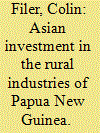

|
|
|
|
|
| Publication |
2013.
|
| Summary/Abstract |
One part of the Australian colonial legacy in PNG is the Australian government's attempt to forge partnerships with different groups of foreign companies in different economic sectors in order to lay the economic foundations for rural development in the newly independent nation. American and Australian capital was invited to develop the mining industry, European capital to develop the oil palm industry, and Japanese capital to develop the forest industry. Nowadays, the Australian government seems to have forgotten its late colonial enthusiasm for this form of state capitalism, and its aid to PNG is largely framed by the neo-liberal policy prescriptions which the World Bank was able to impose on the PNG government through a sequence of structural adjustment programs beginning in 1990. However, members of PNG's national political elite have persistently sought refuge from this economic orthodoxy through their engagement with Asian governments and companies. In this paper I examine the way in which changing political and economic conditions have affected the actual pattern of Asian investment in PNG's forestry and agriculture sectors, and the way in which different stakeholders have responded to this changing pattern of investment. Despite the prevalence of a policy narrative which holds Asian investors responsible for the corruption of PNG's political institutions when mineral resource booms liberate national politicians from the constraints of Western economic orthodoxy, I show that Asian investment in these two sectors has taken several different forms, and there is no simple sense in which PNG's national economy and political system are subject to a concerted takeover by Asian business interests.
|
|
|
|
|
|
|
|
|
|
|
|
|
|
|
|
| 2 |
ID:
120823
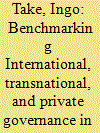

|
|
|
|
|
| Publication |
2013.
|
| Summary/Abstract |
The question of how to overcome the democratic deficits of global forms of governance has led to a pretentious academic debate. To proceed in theory-building, we need to assign systematically the theory-driven assumptions on legitimate forms of governance beyond the nation-state with the various, already observable forms of global governance. Thereto, the paper is aiming at a systematic comparative appraisal of the legitimatory quality of different patterns of governance by applying suitable indicators for their measurement. The innovative potential of this paper is the application of a structured, focused comparison that interconnects a multi-dimensional concept of legitimacy (input-, throughput- and outputdimension) with the triad of international, transnational and private forms of governance. As far as the chosen indicators show a legitimizing effect, they should serve as a standard for upcoming research studies and, by this, contribute to further systematization of studies on global governance. At least, the analysis of the constitutive criteria of cross-border governance arrangements in a legitimacy-based theoretical perspective shall also help to identify their discrete potential for legitimacy and indicate ways for their institutional safeguard and transformation to other arrangements. The conceptual outline will be completed by a case study on forest governance.
|
|
|
|
|
|
|
|
|
|
|
|
|
|
|
|
| 3 |
ID:
144758


|
|
|
|
|
| Summary/Abstract |
The much studied 1999 big bang of Indonesian government decentralization was, in the end, relatively muted and quickly undone in forestry. This paper assesses the big bang as it relates to forestry. It reviews the extensive body of literature that was produced in the years immediately after the big bang occurred, as well as siting it in the longer sweep of Indonesian forestry history. The paper finds that there has been a long-term centralizing tendency in forestry governance, with nation-building and assertion of power over resources in the periphery being key centralizing forces. However, there are valid reasons for decentralized forestry management, such as improving rural development and respecting traditional rights through more accountable and responsive institutional arrangements. It is suggested here that a number of changing factors in Indonesia and in forestry could provide opportunities for a more enduring decentralization in forestry. These include strengthening democratic institutions, a declining role for natural forests in wood production as plantations replace supplies, and a shift to forms of governance built on systems thinking. For these reasons, it is suggested that the promises of decentralized forest governance might be delivered, not as a central government-ordained big bang, but rather as a progressive, paradigmatic evolution.
|
|
|
|
|
|
|
|
|
|
|
|
|
|
|
|
| 4 |
ID:
175051


|
|
|
|
|
| Summary/Abstract |
Despite ongoing political tensions and sanctions, North Korea and South Korea have made some progress in forestry cooperation. To explain the persistence of this cooperation, we draw upon a local approach to environmental peacebuilding. By tracing inter-Korean forestry cooperation from 2000 to 2018, this study finds that cooperation persists because of a North Korean desire for cooperation specifically on the environment, and because non-governmental organisations (NGOs) with close ties to the South Korean government provided an alternative way to implement inter-Korean forestry cooperation through periods of tension. Our findings also highlight the benefits of using environmental cooperation as a way to engage with North Korea in a depoliticised and sanction-free context. This finding has far-reaching implications for environmental peacebuilding. First, NGOs can pave the way for engaging conflict parties even in the face of ongoing hostility. Second, environmental cooperation provides an opportunity for a win–win strategy for conflict parties.
|
|
|
|
|
|
|
|
|
|
|
|
|
|
|
|
| 5 |
ID:
136240


|
|
|
|
|
| Summary/Abstract |
Community views toward the risks and benefits of emerging renewable energy technologies are important factors in facility siting decisions and their eventual success. While the actual socioeconomic and biophysical impacts of proposed industrial developments are fraught with uncertainty, understanding public perceptions is critical in managing costs and benefits to local citizens. Here, we explore the social acceptability of forest-based biorefineries in Maine using random utility modeling to identify how project attributes and citizen characteristics interact to affect level of support. Using a statewide sample (Statewide) and a subsample of mill towns (Mill Towns), we found that: (1) in both samples, individual characteristics had similar coefficients and significance levels except for pro-environment attitudes; (2) the coefficients related to the industry’s negative attributes were notably different between the two samples, while positive attributes were not; (3) in both samples, positive industry attributes such as “producing products from a sustainable resource” and “increased economic development” were the most influential variables in determining the level of support for a new biorefinery in an individual’s community; and (4) in general, Mill Town respondents were more accepting of potential negative attributes such as increased levels of truck traffic, odor, noise, and air and water pollution.
|
|
|
|
|
|
|
|
|
|
|
|
|
|
|
|
| 6 |
ID:
127519


|
|
|
| 7 |
ID:
117946
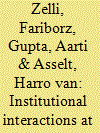

|
|
|
|
|
| Publication |
2013.
|
| Summary/Abstract |
This article argues that institutional interactions that cut across the domains of trade and environment are embedded in overarching norms that shape their evolution and impact. In making this argument, it analyzes three cases of such interactions within the climate change and biosafety regime complexes: those relating to trade-related climate policies and measures, forest carbon sinks, and trade in genetically modified organisms. The analysis highlights the dominance of liberal environmentalism (a set of global norms promoting economic efficiency and environmental improvements through market-based mechanisms) in shaping institutional interactions within these regime complexes, even as liberal environmentalism is contested by key actors. This, in turn, has implications for effective management of institutional interlinkages within regime complexes in global environmental governance.
|
|
|
|
|
|
|
|
|
|
|
|
|
|
|
|
| 8 |
ID:
163556


|
|
|
|
|
| Summary/Abstract |
There is a growing literature on the potential contributions the global forest sector could make toward long-term climate action goals through increased carbon sequestration and the provision of biomass for energy generation. However, little work to date has explored possible interactions between carbon sequestration incentives and bioenergy expansion policies in forestry. This study develops a simple conceptual model for evaluating whether carbon sequestration and biomass energy policies are carbon complements or substitutes. Then, we apply a dynamic structural model of the global forest sector to assess terrestrial carbon changes under different combinations of carbon sequestration price incentives and forest bioenergy expansion. Our results show that forest bioenergy expansion can complement carbon sequestration policies in the near- and medium-term, reducing marginal abatement costs and increasing mitigation potential. By the end of the century these policies become substitutes, with forest bioenergy expansion increasing the costs of carbon sequestration. This switch is driven by relatively high demand and price growth for pulpwood under scenarios with forest bioenergy expansion, which incentivizes management changes in the near- and medium-term that are carbon beneficial (e.g., afforestation and intensive margin shifts), but requires sustained increases in pulpwood harvest levels over the long-term.
|
|
|
|
|
|
|
|
|
|
|
|
|
|
|
|
| 9 |
ID:
161169


|
|
|
|
|
| Summary/Abstract |
This article analyzes Turkish forestry as a site of nation building. To understand the ways in which forestry shaped ideas of the state and citizenship, I explore the history and memories of the forestry enterprise, Zingal, from the early 20th century to the present. I argue that the conflicting narratives around Zingal in archives and memory are symptoms of the contradictions inherent to nationalist modernity. I also reveal the continuation of similar contradictions in the 21st century by showing how citizens’ discourse of resentment over deindustrialization can coexist with their objection to a potential nuclear industry.
|
|
|
|
|
|
|
|
|
|
|
|
|
|
|
|
| 10 |
ID:
099615
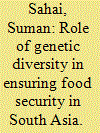

|
|
|
|
|
| Publication |
2010.
|
| Summary/Abstract |
Genetic diversity in the field is the key to long-term sustainable food production. In agriculture and forestry, genetic diversity can enhance production in all agricultural and ecosystem zones. Genetic erosion is the loss of genetic diversity, which is being caused not just at the level of individual genes but at the level of gene combination, which is even more dangerous. The main cause of genetic erosion is varietal replacement. However, there are many traditional varieties that are extremely high yielding and that can, in fact, form a much bigger mix of varieties available in the field than this very narrow approach to increasing productivity would suggest. Genetic erosion is happening at a more rapid pace in developing countries because of the somewhat faulty planning to bring about change and increase productivity. Above all, agrobiodiversity, which is genetic diversity related to agriculture, is threatened not because of overuse but because it is not used
|
|
|
|
|
|
|
|
|
|
|
|
|
|
|
|
| 11 |
ID:
084227
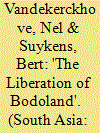

|
|
|
|
|
| Publication |
2008.
|
| Summary/Abstract |
Bodoland, located in western Assam, has been a theatre for insurgencies since the mid 1980s. Too often, migration has been the paradigmatic framework to analyse not only this, but most conflicts, raging in Assam. In this article we argue that migration in itself is insufficient to understand the problems in Bodoland. Instead, we focus on forestry and tea estates, and contend that they, forming important restrictive structures, caused tribal entrapment, finally leading to violence. Moreover, we claim that during the conflict a shift in control over these structures occurred, changing the livelihood arithmetic of the involved communities. Finally, we discuss both the restraints and opportunities of the BTC/BTAD (Bodoland Territorial Council/Bodoland Territorial Administrative District)-the result of the peace process-and warn that the escape from entrapment for the Bodo could lead to the entrapment of other communities in the area.
|
|
|
|
|
|
|
|
|
|
|
|
|
|
|
|
| 12 |
ID:
148198


|
|
|
|
|
| Summary/Abstract |
Amid the rolling green-forested hills, a meandering trout stream, and tall grasslands of the Carson National Forest in northern New Mexico, the delegation of Central Asian conservation leaders listened intently as United States Forest Service (USFS) rangers and a coalition of public-private partners explained innovative conservation and restoration practices.
|
|
|
|
|
|
|
|
|
|
|
|
|
|
|
|
| 13 |
ID:
158204
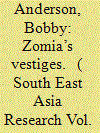

|
|
|
|
|
| Summary/Abstract |
Opium poppy cultivation in Thailand fell from 12,112 hectares in 1961 to 281 hectares in 2015. One outlier exists: Chiang Mai Province’s remote southwestern district, Omkoi. Ninety percent of the district is a national forest reserve where human habitation is illegal. However, an ethnic Karen population has lived there since long before the law that outlawed them was created, unconnected to the state by road, with limited or no access to health, education and other services. Omkoi’s Karen increasingly rely on cash-based markets. Their lack of citizenship precludes them from land tenure that might incentivize them to grow alternative crops, and their statelessness precludes them from services and protections. Nor is the Thai state the singular Leviathan that states are often assumed to be; it is a collection of agencies and networks with divergent interests, of whom one of the most powerful, the Royal Forestry Department, has purposely made Omkoi’s population illegible, and has consistently blocked the attempts of other state actors to complexify Omkoi beyond the simplicity of its forest environment. These factors make the state illegitimate to Omkoi’s Karen just as Omkoi’s Karen are illegitimate to the state, and make the cultivation of short-term, high-yield, high-value, imperishable opium a logical economic choice for poor Karen farmers, especially given the historical lack of law enforcement presence. However, that presence is growing, as Omkoi becomes one of the last areas of Thailand to experience the historical extension of lowland Padi state power into an ungoverned, untallied highland.
|
|
|
|
|
|
|
|
|
|
|
|
|
|
|
|
|
|
|
|
|